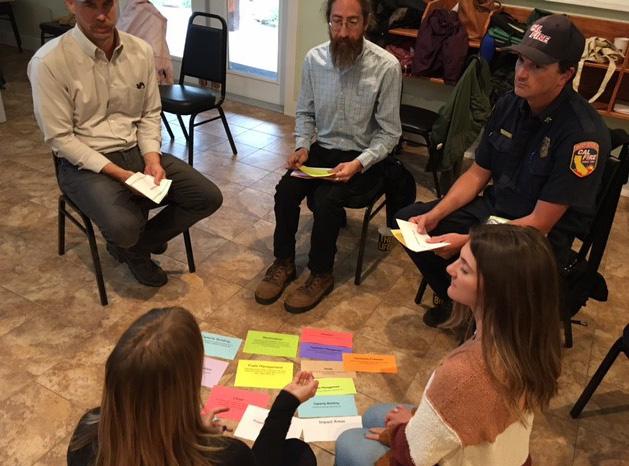
4 minute read
Regional Priority Planning
To curate and support collaborative regional planning and organizing for implementation of wildfire resiliency efforts in our region, RCDGSDC invested in building a framework to coordinate and strengthen communication and relationships with regional partners. Part of this effort has involved providing resources to help partners with project development before and alongside the data collection period. RCDGSDC invited local stakeholder groups such as Tribes, land managing agencies, resource protection agencies, fire agencies, community Fire Safe Councils, non-profit organizations, local practitioners, advisory and research groups, and other community organizations to engage in this process to identify and organize wildfire resiliency projects.
Providing Resources
RCDGSDC supported groups with developing projects and addressing barriers to project progress through providing planning and implementation resources and technical assistance. In addition to the specific capacity building demonstration projects referenced earlier, funding also provided support to other groups to further project readiness through GSOB Management plans, Community Wildfire Protection Plans (CWPP), environmental compliance for fuels reduction projects, and working toward increased awareness and accessibility for prescribed burning.
One major achievement in partnership with the Fire Safe Council of San Diego County is the streamlining and increased accessibility of the annual CWPP Writers’ Workshop Series. A CWPP is a comprehensive document required for most grant awards that identifies priorities for protection of life, property, and critical structures in fire-prone communities in the wildland-urban interface. Participants are provided with a template, support with mapping, and connections to local fire agencies for each community to plan and develop or update their CWPP document. The interactive workshop allows for subject matter experts to provide guidance and support. Once the documents are drafted by the community group, a review committee of regional representatives completes the authorization and signatures for approved plans. In January 2023, the first CWPP Writers’ Workshop focused on Tribal nations was included in the series, hosted by Pala Band of Mission Indians. There are currently 33 approved community-level CWPP documents in San Diego County, many CWPP projects have been included in the Priority Project List.
Data Collection
After two years of building relationships and networks, and offering support, RCDGSDC was ready to begin collecting data for the RPP. This was done through a phased approach, as follows. First a series of bi-monthly public meetings were conducted, which included targeted outreach to invite community leaders, Tribal nations, organizations, and agencies to participate in the regional priority planning process. Then, groups submitted project data using the online project submission form.
Outreach And Engagement Phase
Stakeholders were asked to share their list of planned and conceptual projects and to identify barriers that are preventing this work from being completed as well as possible solutions. This project data helped to inform the Plan and Priority Project List, creating the first draft of this living document. The Project List will bring greater awareness and understanding of the diverse needs of the region for local, state, and federal decision makers and funders for future investments.
Stakeholders proposed potential solutions and projects that could protect critical infrastructure, communities, and landscapes through targeted efforts such as suppressing GSOB infestations, modification of fuels adjacent to roads to prevent ignitions, creation or maintenance of fuel breaks in strategic locations, vegetation clearance in critical locations to reduce wildfire intensity and rate of spread, restoration of habitats, and implementation of cultural and prescribed burning as potential fuel management tools. Also identified were critical capacity building needs which include assistance with gathering and sharing information with the community, project planning and environmental compliance, investments to provide forestry and fuels workforce training opportunities, access to equipment, skilled staff positions to assist with this work, and interagency collaboration.
Project Submission Phase
To gather project information from a diverse group of stakeholders, a data collection system was developed that could track all projects consistently. With the help of GrizzlyCorps Fellows, RCDGSDC developed an online survey tool using Formstack and invited stakeholders to participate using the online Project Submission Form. Standardizing the consistency of the data in this way is an important component in understanding the projects that stakeholders want to work on, projects that they have started to plan, or even already have in progress - allowing for greater understanding of what the critical next steps are toward implementation, and how best to advocate for each project. The first public data collection period opened in Fall 2022 and closed in December of 2022. Some of the project information collected includes Project Sponsor or Lead Organization, Treatment Types, Project Status, Location, Scheduling Priority/Urgency, Cost, Commitment from partners, and Impact Areas.






